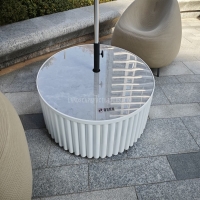Welcome to the website for landscape facilities products and knowledge.
How does the choice of base material (e.g., metal, wood, stone) affect the stability of a landscape bar counter?
The selection of base material fundamentally determines the long-term stability and performance of landscape bar counters in outdoor environments. Metal bases, typically constructed from powder-coated aluminum or stainless steel, offer exceptional structural integrity and resistance to warping. Their inherent strength provides superior load-bearing capacity for heavy countertop materials, though they may require thermal expansion joints in extreme temperature fluctuations.
Wooden foundations, particularly using weather-resistant species like teak or pressure-treated cedar, provide natural aesthetic appeal but demand rigorous maintenance. Without proper sealing, wood is susceptible to moisture absorption leading to swelling, rot, and insect infestation. However, when properly treated, wood offers excellent vibration damping properties and thermal insulation.
Stone bases, including granite, limestone, or manufactured composite materials, deliver unparalleled compression strength and environmental resistance. Their massive weight creates inherent stability against overturning, making them ideal for windy locations. The primary considerations include ensuring adequate subsurface preparation and accounting for potential calcium leaching in wet environments.
The material choice directly influences installation methodologies. Metal frames often require concrete footings for permanent installation, while wooden structures may utilize adjustable pedestals for leveling on uneven surfaces. Stone foundations typically demand professional installation due to their excessive weight and need for perfectly level substrates.
Environmental factors dramatically affect material performance. Coastal environments accelerate metal corrosion despite protective coatings, while ultraviolet radiation degrades wooden structures over time. Stone materials generally demonstrate the highest resistance to environmental degradation but may develop surface efflorescence in humid conditions.
Maintenance requirements vary significantly between materials. Metal bases need periodic coating inspections, wooden structures require seasonal resealing, while stone bases generally need only routine cleaning. The lifetime cost of ownership must factor in these maintenance activities alongside initial installation expenses.
Ultimately, the optimal material selection balances structural requirements, environmental conditions, aesthetic preferences, and maintenance capabilities. Hybrid approaches often provide superior solutions, such as metal structural frames with wooden cladding or stone veneers over concrete substrates. Professional consultation is recommended to assess specific site conditions and usage requirements before finalizing material selection.
Related search:

Recommendation
Round metal tube border design table with tempered glass or granite countertop on the top.